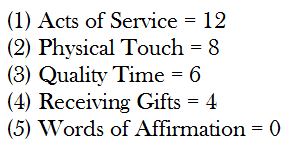The Five Love Languages: The Secret to Love That Lasts by Gary Chapman [1995; Audiobook, July 2006]
(Warning: Book Review + Relationship Autopsy ahead)
A friend of mine recommended that I read this book shortly after my husband got together with the mistress that would end our marriage. She described Chapman’s theory to me in detail and said that she felt my husband and I had experienced so many disconnects because we speak different “love languages.” The theory sounded solid, so I asked my husband to read it with me, but to no avail. While I liked the idea of the book, I didn’t actually get around to audiobooking it until now, well over a year later.
The basic premise of The Five Love Languages is a simple one: people give and perceive love in different ways (“languages”) and couples often experience disconnects because one person’s way of showing love falls flat with another person. The five languages Chapman lays out for us are Quality Time, Physical Touch, Acts of Service, Words of Affirmation, and Receiving Gifts. For example, a woman who experiences love primarily through Receiving Gifts may not feel loved when her husband regularly compliments her and says how much he appreciates her (Words of Affirmation). That same husband may feel baffled that his wife feels so unappreciated when he tells her how wonderful she is all the time. He is giving love in his primary love language, but she feels love in a different way, therefore they disconnect and both feel frustrated.
(BTW, having “Physical Touch” as a primary language is not the same thing as “I like sex.” The book covers this.)
The book also covers the difference between the euphoria that is being “in love” and real, lasting relationship love, and on that note, I could not agree with the book more. The euphoria of a new relationship is like a drug. It does not, by itself, create lasting relationships, it is temporary, and when it wears off, many couples find themselves struggling with how to love. Chapman insists that love is a choice, and a person who learns of (and agrees with) his theory will make an active attempt to use his or her partner’s primary love language in expressing love, even when that is far from the primary language of the one giving love. For years, I have insisted on seeing love as a choice rather than a euphoric feeling, and feel that there is wisdom in such a take on love.

It’s a shame that I did not know about this book years ago. I’m not certain that it could have saved my marriage—infidelity is about poor character and a bloated sense of entitlement, which no amount of speaking the same “love language” will fix—but I know now that we did experience many disconnects because my primary love language (Acts of Service) was his least valued love language. I would do chores, errands, and kind things for him only to have him not notice/not care, while he almost never did chores for me. Conversely, his primary love language (Quality Time), which is my 3rd language, is something we did not make a lot of time for due to jobs and finances. We both had Physical Touch as a secondary language, and that was enough to keep us together for almost eleven years, but it wasn’t enough to run on forever. My ex-husband actually did read the book in January of this year and made what seemed to be a few sincere gestures at wanting to reconcile. We talked at length about how our “love languages” differed and where we had gone wrong. Reconciliation did not happen for several reasons, one of them being that “other women” were still a factor for him, but it was cathartic to have a clearer understanding of some of the areas where our marriage had been a struggle.
I have a few criticisms of the book. It was originally published in the mid-90s and needs a gender-inclusive language update. Most of the examples of couples used are Stay-At-Home-Mom/Homemaker + Husband Breadwinner; I counted two examples of working women, one of whom was said to be working part-time “mostly to get out of the house.” (Newsflash: women don’t need excuses for why they work outside the home any more than men do!) Even the women who worked seemed to have stories where there was some expectation that they would be doing most of the at-home tasks. It felt like something out of the 50s in that regard, not the 90s, and needs to be updated to include examples of more diverse work situations: both parents work, mom works while dad stays home, work-from-home parents, etc.
I was also a little troubled by two examples of couples that were given. One was an adulterer who abandoned his wife and later came back to her and got a happily-ever-after when his affair failed. I felt like the man’s abuse of his wife was not taken seriously enough. The other was a story about some moron who thought it was cool if he left to play softball at key moments in his wife’s life (after his baby’s birth, after his wife’s mother’s funeral). Chapman says this man needed to give his wife the gift of his presence because his wife’s love language was “Receiving Gifts.” I say this man needed to give his wife the gift of acting like a grown-up, because doing boring things like births and funerals is how grown-ups are supposed to behave (!!!).
Criticism aside, I believe that the principles of this book can help me with future relationships. I also believe it will help me with my children (the book has a section on how the languages apply to children). I am not entirely sure of my daughter’s primary language; it might be “Receiving Gifts,” but I think more observation is needed. My son, however, has (since he could walk) had an odd habit of following me to wherever I am and staying close to me. He may not be paying attention to me, he may be playing on his Kindle or phone while I work on a paper for school, but he insists on being in the same room with me and sitting/laying next to me. As I read this, the thought occurred to me that he does this because his primary love language is “Quality Time.” I will have to experiment and see how he reacts.

In my inexpert divorcée opinion, Five Love Languages is one of the most significant books a soon-to-be-married couple can read in order to prepare for marriage. Between this and Dave Ramsey’s Financial Peace University classes, I know what I’ll recommend to my children to prepare them for serious relationships.




“BTW, having “Physical Touch” as a primary language is not the same thing as “I like sex.” The book covers this.”
I found it didn’t really – I suspect Chapman is as confused as myself on this one.